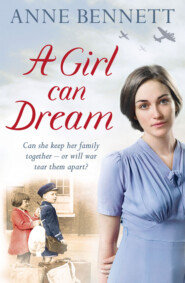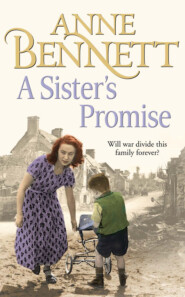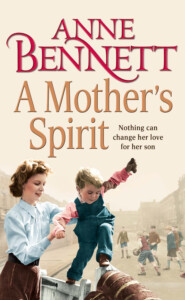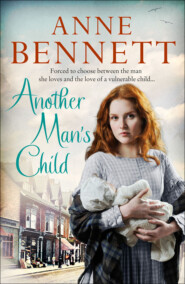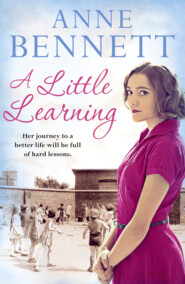По всем вопросам обращайтесь на: info@litportal.ru
(©) 2003-2025.
✖
Forget-Me-Not Child
Автор
Год написания книги
2019
Настройки чтения
Размер шрифта
Высота строк
Поля
‘That’s because everything’s different here,’ Barry said. ‘Hurry up and get ready.’
They crept down the stairs quietly holding their shoes, but there was no kettle boiling on the range, nor any sign of activity, and no wonder for the time on the clock said just six o’clock. On the farm the milking would have all been done by that time, but in a city it seemed six o’clock on a Sunday is the time for laying in bed. And then he remembered there might be no breakfast at all because they were likely taking communion and no one could eat or drink before that. It wouldn’t affect Angela, nor he imagined the two youngest Dochertys, Sammy and Siobhan, whom he’d met the night before. They were only five and six, but the other two, Frankie and Philomena, were older. He had no need to fast either for he hadn’t made his First Holy Communion yet. Had he stayed in Ireland he would have made it in June, but here he wasn’t sure if it would be the same. It did mean though he could eat that morning and he searched the kitchen, which wasn’t hard to do since it was so tiny and, finding bread in the bin, he cut two chunks from one of the loaves, spread it with the butter he’d found on the slab and handed one to Angela.
But Angela just looked at him with her big blue eyes widened. ‘Here, take it,’ he said.
‘It must be wrong,’ she cried. ‘We’ll get into trouble.’
‘I might get into trouble but you won’t,’ Barry assured Angela. ‘But you must eat something because you have had nothing since the bread and butter in the boat dinner time yesterday. We had stew last night but you were too sleepy and Mammy put you to bed, so you must eat something and that’s what I’ll say if anyone is cross. You won’t be blamed so take it.’
He held the bread out again and this time Angela took it and when she crammed it in her mouth instead of eating it normally Barry realized just how hungry she had been and he poured her a glass of milk from the jug he had found with the butter on the slab to go with it. ‘Now you’ve got a milk moustache,’ he said with a smile.
Angela scrubbed at her mouth with her sleeve and then said to Barry, ‘Now what shall we do?’
‘Well, it doesn’t seem as if anyone is getting up,’ Barry said, for it was as quiet as the grave upstairs when he had a listen at the door. ‘So how about going and having a look round the place we are going to be living in?’
‘Oh yes, I’d like that.’
‘Get your shoes on then and we’ll go,’ Barry said.
A little later when Barry opened the front door Angela stood on the step and stared. For all she could see were houses. Houses all down the hill as far as she could see. She stepped into the street and saw her side of the street was the same. And she couldn’t see any grass anywhere. There had been other houses in Ireland dotted here and there on the hillside, but the only thing attached to their cottage was the byre and the barn beyond that. There wasn’t another house in sight and you would have to go to the head of the lane to see any other houses at all. To see so many all stacked up tight together was very strange.
‘Where do you go to the toilet here?’ Angela asked, suddenly feeling the urge to go.
‘Down the yard,’ Barry said. ‘I’ll show you. Mr Docherty took me down the yard last night, we need a key.’
He nipped back into the house to get it before taking Angela’s hand and together they went down to the entry of the yard. As Barry had seen in the dark, now she also saw that six houses opened on the grey cobbled yard and crisscrossing washing lines were pushed high into the sooty air by tall props.
Barry said, ‘Norah told us last night some women wash for other people. Posh people, you know, because it’s a way of making money and they have washing out every day of the week except Sunday. And this is the Brewhouse where Mick says all the washing gets done,’ he added as they went past a brick building with a corrugated tin roof.
The weather-beaten wooden door was ajar and leaning drunkenly because it was missing its top hinges. Angela peeped inside and wrinkled her nose. ‘It smells of soap.’
‘Well it would be odd if it smelled of anything else,’ Barry said, ‘and these two bins we’re passing have to be shared by the Dochertys and two other families. One is for ashes, called a miskin, and the black one is for other rubbish.’
‘Don’t you think it’s an odd way of going on?’ Angela asked.
Barry nodded. ‘I do,’ he said in agreement. ‘And you haven’t seen the toilets yet, they’re right at the bottom of the yard and two other families have to share them as well. They have a key to go in and you must lock it up afterwards. The key is always kept on a hook by the door.’
Angela found it was just as Barry said and as she sat on the bare wooden seat and used the toilet she reflected that Mammy had been right, they had an awful lot of things to get used to.
Stopping only to put the key back on its hook, the two started to walk down the slope towards Bristol Street and Barry wondered what Angela was thinking. He’d had a glimpse of the area as he had walked up Grant Street with everyone else the previous evening. He didn’t think they looked very nice houses, all built of blue-grey brick, three storeys high with slate roofs and they stood on grey streets and behind them were grey yards. He didn’t think his mother had been impressed either, but she had covered the look of dismay Barry had glimpsed before anyone else had seen it.
So he wasn’t surprised at Angela’s amazement as she looked from one side to the other. ‘There’s lots of houses aren’t there Barry?’ she said as they started to go down Bristol Passage.
‘Yeah, but this is a city and lots of people live in a city and they all have to have houses.’
‘Yes, I suppose,’ Angela said.
‘D’you think you’ll like living here?’ he said as they strode along Bristol Street. Despite it being still quite early on a Sunday morning there were already some horse-drawn carts and petrol lorries on the road and a clattering tram passed them, weaving along its shiny rails. There were plenty of shops too, all shut up and padlocked. Angela said, ‘I don’t know.’
‘It’s all strange here isn’t it? Not a bit like home.’
‘No, no it isn’t.’
‘Tell you what though,’ Barry said. ‘This is probably going to be our home now, not Mr and Mrs Docherty’s house, but this area. So I’m going to make sure I like it. Don’t do no good being miserable if you’ve got to live here anyway.’
That made sense to Angela but Barry always seemed to be able to explain things to her so she understood them better. ‘And me,’ she said.
‘Good girl,’ Barry said with a beam of approval and he reached for her hand as he said, ‘We best go back now because we’ll probably be going to an early Mass and we daren’t be too late.’
Everyone was up at the Dochertys’ and Mary asked where they had both been and would have gone for Barry when he attempted to explain, but Norah forestalled her. ‘It was obvious Angela would wake early,’ she said to Mary, ‘because she had her sleep out and it was good of Barry to take her downstairs and let us have a bit of a lie in.’
‘But to take food without asking!’
‘Well he couldn’t ask me without waking me up first and that wouldn’t have pleased me at all,’ Norah pointed out and added with a little laugh, ‘It was just a bit of bread and it’s understandable that Angela would be hungry. Don’t be giving out to them their first morning here.’
‘I was starving,’ Angela said with feeling.
‘Course you were,’ Norah said. ‘You hadn’t eaten for hours.’
Barry let out a little sigh of relief, very grateful to Mrs Docherty for saving him from the roasting he was pretty sure he had been going to get from his mother, and when she said, ‘Anyway come up to the table now for I have porridge made for you two and Sammy and Siobhan,’ the day looked even better.
St Catherine’s Catholic Church was just along Bristol Street, no distance at all, and Norah pointed out Bow Street off Bristol Street where the entrance to the school was. ‘I will be away to see about it tomorrow,’ Mary said. ‘I hope they have room for Barry and Gerry for I don’t like them missing time. Wish I could get Angela in too because she’s more than ready for school.’
‘I thought that with Siobhan and was glad to get her in in September,’ Norah said. ‘I think when they have older ones they bring the young ones on a bit.’
‘You could be right,’ Norah said. ‘I know our Angela is like a little old woman sometimes, the things she comes out with.’
‘Oh I know exactly what you mean,’ Mary said with feeling. ‘Mind I wouldn’t be without them and I did miss the boys last night. Be glad to see them at Mass this morning.’
The boys were waiting for them in the porch and they gave their anxious mother a good account of Stan Bishop and his wife Kate, who they said couldn’t have been kinder to them. That eased Mary’s mind for her children had never slept apart from her in a different house altogether and she thought it a funny way to go on, but the only solution in the circumstances.
After Mass, Norah introduced them to the priest, Father Brannigan, and he was as Irish as they were. Mary’s stomach was growling embarrassingly with hunger and she hoped he couldn’t hear it. She also hoped meeting him wouldn’t take long so she could go home and eat something, but she knew it was important to be friendly with the priest, especially if you wanted a school place for your children. Matt understood that as well as she did and they answered all the questions the priest asked as patiently as possible.
It might have done some good though, because when he heard the two families were living in a cramped back-to-back house with the older boys farmed out somewhere else, he said he’d keep his ear to the ground for them.
‘Well telling the priest your circumstances can’t do any harm anyway,’ Norah said. ‘Priests often get to know things before others.’
‘No harm at all,’ Mary agreed. ‘Glad he didn’t go on too long though or I might have started on the chair leg. Just at the moment my stomach thinks my throat’s been cut.’
It was amazing how life slipped into a pattern, so that living with the Dochertys and eating in shifts became the norm. Gerry and Barry were accepted into St Catherine’s School and went there every day with all the Docherty children and Angela was on the waiting list for the following year when she would be five. Better still, Stan Bishop said he could get Sean into the apprentice scheme to be a toolmaker and Gerry could join him in two years’ time, and he could find a labouring job for Matt the same as Mick, so that by the beginning of June the two men and the boy Sean were soon setting off to work together.
Sadly, Stan could find nothing for the two older boys who were too old for the apprentice scheme, which had to be started at fourteen, and there was no job for them in the foundry. They were disappointed but not worried. It wasn’t like living in rural Donegal. Industrial Birmingham was dubbed the city of one thousand trades and just one job in any trade under the sun would suit Finbarr and Colm down to the ground.
So they did the round of the factories as Stan advised, beginning in Deritend because it was nearest to the city centre and moving out to Aston where the foundry was. They started with such high hopes that surely they would be taken on somewhere soon. ‘The trick,’ Stan said, ‘is to have plenty of strings to your bow. Don’t go to the same factory every day because they’ll just get fed up with you but don’t leave it so long that they’ve forgotten who you are if they have given you any work before. And if you’re doing no good at the factories go down to the railway station and offer to carry luggage. It’s nearly summer and posh folk go away and might be glad of a hand and porters are few and far between. Or,’ he added, ‘go to the canal and ask if they want any help operating the locks or legging the boats through the tunnels.’
‘What’s that mean, “legging through the tunnel”?’
‘You’ll find out soon enough if they ask you to do it,’ Stan said with a smile. ‘Just keep going and something will turn up I’m sure.’






